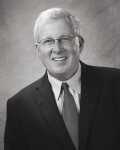Local residents respond to Mandela's passing

The world lost an important figure Thursday, Dec. 5, with the death of Nelson Mandela.
Mandela, a South African anti-apartheid revolutionary, politician and philanthropist, and controversial figure for much of his life, died in his home in Johannesburg of a lung infection at the age of 95. His death was announced by current South African President Jacob Zuma.
The Tribune recently talked with a few local residents about Mandela's legacy and impact on history.

Retired history teacher Norm Conard, currently the director of the Lowell Milken Center, said Mandela was "a huge figure, even in America" and referred to his death as "the passing of a legendary person."
"We at the center have great respect for what he did," Conard said.
Zuma announced a national mourning period of 10 days on Dec. 6, with the main event being an official memorial service to take place today in Johannesburg. Zuma declared Dec. 8 a national day of prayer and reflection.

Mandela's body will lie in state Wednesday through Friday and a state funeral will take place on Sunday, Dec. 15.
The government of South Africa has confirmed that at least 80 foreign heads of state and government plan to travel to South Africa to attend funeral events. Other notable guests include President Barack Obama and former presidents of the U.S., as well as various royal dignitaries.
"That speaks for what he stood for," Conard said.
Conard added, "His life was a tremendous story. He was an incredible man. It's a loss for the world."
Conard said Mandela played a key role in the struggle for African independence and freedom.
Robert Nelson, member of the Fort Scott Community College Board of Trustees, called Mandela "a world leader like no other." Mandela served more than 27 years in prison for the work he was doing to end apartheid and was released in 1990.
"Anyone who could spend that amount of time in prison and not continue with hate in his body or soul -- that's rare," Nelson said. "We need more people like that."
Perhaps Mandela's greatest achievement, Nelson said, was "bringing a nation together" and his actions may have gone beyond that.
"I would say he brought the world together in his actions," Nelson said. "What he did was just amazing, and knowing where he came from and what he had to endure was pretty incredible."
Mandela was proof that "one man can change the world," Nelson said.
"He impacted a lot of people," he said. "I was especially impressed when seeing how the younger generation is responding to him. They didn't even know him and yet they revered him," Nelson said after watching news coverage of young people talking about Mandela.
"It's nice to give credit to whom it is due," he said.
Mandela served as president of South Africa from 1994 to 1999 and was the first black South African to hold the office. He was also the first elected in a fully representative democratic election. His government focused on dismantling the legacy of apartheid through tackling institutionalized racism, poverty and inequality, and fostering racial reconciliation.
Mandela served as president of the African National Congress from 1991 to 1997. Politically, he was an African nationalist and democratic socialist.
"In spite of being a communist, he tended to be a great man," local resident Jim Scott said. "But he didn't allow the idea of communism to interfere with his beliefs."
Scott talked about how Mandela, through rugby in South Africa, used sports "to actually bring his country together -- black and white."
"And considering this was a man who just came out of prison for that many years," Scott said.
He added, "Creating harmony without doing harm to anyone was pretty amazing. He could have caused uprisings and a civil war, and he didn't. He thought it was important through peace."
